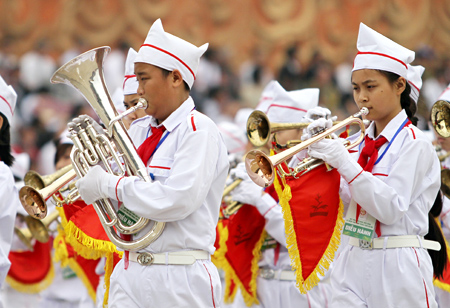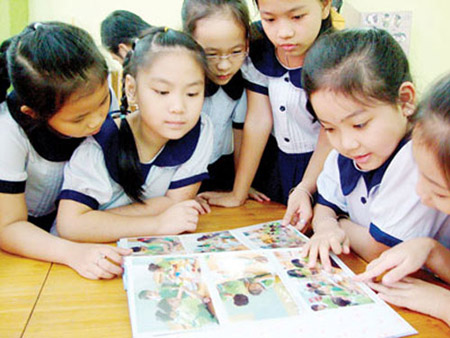ĐỀ CƯƠNG ÔN TẬP TIẾNG ANH 9
Lượt xem: Lượt tải:
| Thông tin | Nội dung |
|---|---|
| Tên tài nguyên | ĐỀ CƯƠNG ÔN TẬP TIẾNG ANH 9 |
| Loại tài nguyên | Phần mềm Giáo dục - Học tập, |
| Tên tập tin | ĐỀ-CƯƠNG-ÔN-TẬP-LỚP-9.docx |
| Loại tập tin | application/vnd.openxmlformats-officedocument.wordprocessingml.document |
| Dung lượng | 57.34 kB |
| Ngày chia sẻ | 11/02/2020 |
| Lượt xem | 1085 |
| Lượt tải | 25 |
| Xem tài liệu | Xem Online |
| Tải về |
BÀI ÔN TẬP LỚP 9: UNIT 7: RECIPES AND EATING HABITS
- NEW WORDS, STRUCTURES AND GRAMMAR
- New words
| Chop (v) | /tʃɒp/ | Chặt | Spread (v) | /spred/ | Phết, bôi, trét |
| Cube (n) | /kjuːb/ | Miếng hình lập phương | Sprinkle (v) | /ˈsprɪŋkl/ | Rắc |
| Deep-fry (v) | /ˌdiːp ˈfraɪ/ | Rán ngập mỡ | Slice (v) | /slaɪs/ | Cắt lát |
| Dip (v) | /dɪp/ | Nhúng | Staple (n) | /ˈsteɪpl/ | Lương thực chính |
| Drain (v) | /dreɪn/ | Làm ráo nước | Starter (n) | /ˈstɑːtə(r)/ | Món khai vị |
| Garnish (v) | /ˈɡɑːnɪʃ/ | Trang trí (món ăn) | Steam (v) | /stiːm/ | Hấp |
| Grate (v) | /ɡreɪt/ | Nạo | Stew (v) | /stjuː/ | Hầm |
| Grill (v) | /ɡrɪl/ | Nướng | Stir-fry (v) | /ˈstɜː fraɪ/ | Xào |
| Marinate (v) | /ˈmærɪneɪt/ | Ướp | Tender (adj) | /ˈtendə(r)/ | Mềm |
| Peel (v) | /piːl/ | Gọt vỏ, bóc vỏ | Versatile (adj) | /ˈvɜːsətaɪl/ | Đa dụng |
| Purée (v) | /ˈpjʊəreɪ/ | Xay nhuyễn | Whisk (v) | /wɪsk/ | Đánh (trứng …) |
| Roast (v) | /rəʊst/ | quay | |||
| Shallot (n) | /ʃəˈlɒt/ | Hành khô | |||
| Simmer (v) | /ˈsɪmə(r)/ | om |
- Grammar:
- Quantifiers: review: a / an / some / any
- Modal verbs in conditional sentences type 1: can / must / may / might / should
- EXERCISES
- Choose a word in each line that has different stress pattern
- versatile B. tomato C. marinate D. chocolate
- include B. combine C. balance D. reduce
- cucumber B. ingredient C. opinion D. nutritious
- teaspoon B. cabbage C. pancake D. canteen
- individual B. supermarket C. avocado D. information
- Match each cooking verb in column A with its definition in column B. Write the answer in each blank.
| Answer | A | B |
| 1. bake | A. cook something slowly in hot liquid kept at or just below the boiling point (85oC/95oC) | |
| 2. roast | B. cook food in hot oil, or fat | |
| 3. boil | C. cook food over charcoal on a grill | |
| 4. fry | D. cook or brown food, like bread or cheese by exposing it to a grill or fire | |
| 5. steam | E. cook, especially meat, in an oven or over a fire | |
| 6. simmer | F. cook meat and vegetables slowly in liquid in a closed dish or pan | |
| 7. toast | G. fry very quickly over high heat | |
| 8. stir-fry | H. cook in an oven without any extra fat | |
| 9. barbecue | I. cook food in boiling water that is 100oC | |
| 10. stew | J. cook food by heating it in the steam made from boiling water |
- Fill each numbered blank with a, an, some or any
Mum: Andy, let’s go to the market. Do you have the list?
| Andy: | I’m doing it now. We need (1)______ apples, (2) ______ bottle of cooking oil and (3)______ bread. Oh, and there isn’t (4)______ salt either. |
| Mum: | Is there (5)________ milk? |
| Andy: | Yes, there’s (6)_______ in the fridge. But we haven’t got (7)________ orange juice. |
| Mum: | Have we got (8)_______ vegetables? |
| Andy: | Well, there is (9)_______ cauliflower, (10)_______ onion and (11)________ potatoes, but there aren’t (12)_______ artichokes. |
| Mum: | Ok. Let’s go shopping then. But before leaving, you should eat something. Is there (13)_______ fruit? |
| Andy: | Yes, Mum, there is (14)_______ banana and (15)_______ orange. But I prefer to have (16)______ muffin or (17)________ chocolate. |
| Mum: | No way, Andy. You know what I think about fatty food. Have (18)_______ banana and (19)________ milk. |
| Andy: | Ok, but … Can I have (20)________ chocolate cake after dinner, please? |
| Mum: | We’ll see. |
- Fill each blank in the following sentences with a food quantifier from the box.
| A bar of | A bowl of | A bunch of | A can of | A carton of |
| A clove of | A loaf of | A slice of | A stick of | A tablespoon of |
- Add _________ vinegar and 200ml of water into the bowl and mix well.
- My brother usually has __________ cereal and some milk for breakfast.
- She bought a grapefruit and _________ bananas at the village market.
- Mummy, can you give me _________ celery, please?
- I have a recipe that calls for only ________ garlic.
- There is ________ bread, some eggs and some salad for dinner.
- You look thirsty. Would you like ________ soda?
- Do you want ________ chocolate or five chocolate sweets?
- Please go to the store and buy ________ milk and if they have sugar, get one kilo.
- He has eaten ________ pizza, two pieces of cake and three eggs.
- Underline the correct verb in each sentence.
- (Stir/ Drain/ Chop) the carrot into small circles.
- (Mix/ Boil/ Bake) the lasagna for 30 minutes in the oven.
- After ten minutes, (drain/ boil/ fry) the spaghetti until there is no water left. Then place the pasta into a large bowl.
- (Peel/ Stir/ Fry) the onion and throw away the skin.
- (Drain/ Marinate/ Chop) the steak with salt, pepper and lemon.
- (Simmer/ Fry/ Bake) the onion until it is soft, but not brown.
- Constantly (fry/ stir/ boil) the mixture using a wooden spoon.
- When the mixture looks shiny, (fry/ pour/ chop) it into individual dishes.
- When you have finished preparing the vegetables, (stir/ mix/ chop) them together with your hands.
- (Fry/ Bake/ Boil) the spaghetti for ten minutes, or until soft.
- Read the passage and do the tasks that follow.
From bush food to barbecues
Australia is a huge country and it has a lot of different kinds of food. In the past, the Aboriginal people of Australia ate animals like crocodiles and some insects like the witchetty grub. Aboriginal Australians travelled around the Australian countryside, or ‘bush’, to find food.
When the first British and Irish people moved to Australia in the 1830s, they brought sheep and cows from Europe. They also brought traditional English and Irish recipes. Many of these recipes, like fish and chips and meat pies, are still popular today. They also created new Australian recipes such as the pavlova (a fruit dessert – named after a Russian dancer) and damper (a bread cooked in the bush).
After 1945, a lot of people came to live in Australia from countries like Italy, Germany, Greece, Thailand and India. They brought recipes with them and Australians began to eat and drink different things. People started to drink espresso coffee and eat Mediterranean and Asian food.
A lot of modern Australians love cooking with fresh food. They often cook food on barbecues in their gardens or on the beach. Today more people also eat Aboriginal food like kangaroo and emu. Mark Olive, an Aboriginal chef, has a popular TV cookery programme about traditional bush food. There are always new recipes to try in Australia!
Task 1. Read the passage again, and decide whether the following statements are true (T), false (F), or not given (NG)
| T | F | NG | ||
| 1. | Australia doesn’t have many different types of food. | |||
| 2. | In the past, Aboriginal people found food in different places. | |||
| 3. | British and Irish people brought food and recipes to Australia. | |||
| 4. | The people who arrived after 1945 didn’t like Australian food. | |||
| 5. | Australians like food from countries like Italy, Greece, and Thailand. | |||
| 6. | Cooking outside is popular in Australia. | |||
| 7. | Today many people in Australia eat crocodile. |
Task 2. Find words in the passage that mean …
- very big (paragraph 1): _____________
- a name for the first people in Australia (paragraph 1): ____________
- somewhere to cook food outside (paragraph 4): ______________
VII. Complete the second sentence in each pair so that it has similar meaning to the first sentence.
- Follow these safety instructions or you may get burnt.
- If you ____________________________________________________
- I suggest having spaghetti and pizza tonight.
- Let’s ______________________________________________
- My aunt has never tasted sushi before.
- This is _____________________________________________
- You need to peel the onion and slice it.
- The onion ___________________________________________
- Eating healthy foods is very important.
- It is ________________________________________________
VIII. Make sentences using the words and phrases below to help you. You can add extra words or make changes.
- Children/ adolescent/ should / eat / sufficient / nutritious / foods / grow/ develop normally.
_____________________________________________________________________
- Although/ eat/ breakfast/ dinner/ home/ students/ usually/ have/ lunch/ school. _____________________________________________________________________
- Healthy lunches/ important/ for/ them/ because/ these/ help/ concentrate/ learning. _____________________________________________________________________
- Some/ student/ usually/ have/ unhealthy lunch/ of/ fast food. _____________________________________________________________________
- School aged/ children/ learn/ fast/ and/ be/ influenced/ friends.
_____________________________________________________________________
- If/ we/ not talk/ them/ about/ healthy eating/ they/ may/ only eat/ junk food. _____________________________________________________________________
- At home/ parents/ should/ encourage/ children/ prepare/ lunchboxes.
_____________________________________________________________________
- They/ should discuss/ healthier/ food choices/ and/ decide/ what/ be/ lunchbox/ with/ children. _____________________________________________________________________
- write a paragraph about Tom’s eating habits for dinner. Use the cues:
Tom’s dinner:
- Often: chicken / pizza
- Sometimes: pasta
- Never: carrots / peas; reason: hate them; prefer potatoes, cabbage
- Dessert: no fruit; usually hot chocolate, biscuits / piece of cake
Your opinion: diet not balanced, healthy
Your advice: eat more kinds of vegetables (carrots, peas, and broccoli); eat fruit
Tom’s eating habits for dinner
_________________________________________________________________________________________________________________________________________________________________________________________________________________________________________________________________________________________________________________________________________________________
- Give the correct form of the verb in brackets.
- If we send an invitation, our friends (come) ………………… to our party.
- He doesn’t understand you if you (whisper) …………………
- She will forget to pick you up if you (not phone) ………………… her.
- If you press “CTRL + S”, you (save) ………………… the file.
- I will remember you if you (give) ………………… me a photo.
- Fred will answer the phone if his wife (have) ………………… a bath.
- If Claire wears this dress at the party, her friends (be) ………………… happy.
- If I touch this snake, my girlfriend (not scream) …………………
- If he (study) ………………… harder, he can pass an exam.
- She may be late if she (not hurry) …………………
- Tell him to ring me if you (see) ………………… him.
- If you are kind to me, I (be) ………………… good to you.
- If he (give) ………………… up smoking, as his doctor orders, he will be soon well again.
- You (not pass) ………………… your driving test unless you drive more carefully.
- He’ll be ill if he (not stop) ………………… worrying so much.
- Jane never (get) ………………… there on time if the train leaves soon.
- I’ll be very angry if he (make) ………………… any more mistakes.
- If he (wash) ………………… my car I’ll give him $10.
- If he (not eat) ………………… all, he will be ill.
- If you ………………… (not finish) your homework, you can’t play computer games.
- Finish each of the following sentences in such a way that it is as similar as possible in meaning to the original sentence.
- I didn’t know that you were in hospital, so I didn’t visit you.
[ If …………………………………………………………………………………………
- Hurry up or you will be late.
[ If …………………………………………………………………………………………
- She is very busy, so she can’t help me now.
[ If …………………………………………………………………………………………
- He didn’t phone me because he didn’t know my phone number.
[ If …………………………………………………………………………………………
- You’re unfit because you don’t take exercise.
[ If …………………………………………………………………………………………
- Unless you are careful, you will cut yourself with that knife.
[ If …………………………………………………………………………………………
- If I have time, I’ll help you.
[ Unless ………………………………………………………………………………….
- He didn’t study his lessons very carefully, so he gets bad marks now.
[ If …………………………………………………………………………………………
- Dick often causes accidents because he drives carelessly.
[ If …………………………………………………………………………………………
- I can’t apply for that job because I don’t know English.
[ If …………………………………………………………………………………………
__________________Hope you have a meaningful time! _________________


























